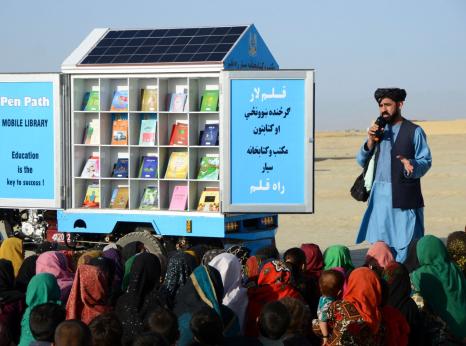Afghanistan: Education Activist Arbitrarily Arrested

Matiullah Wesa is an education activist, founder, and head of PenPath, a collective of 3000 volunteers who campaign in remote districts and provinces of Afghanistan on the importance of education, especially girls’ education. PenPath implemented volunteer programs to advance human rights and girls’ access to education.
At first, through PenPath Wesa and his colleagues worked with religious scholars and tribal elders to build community support for educating all children, setting up schools in villages where there was no government education, and sent mobile classrooms to the most remote areas.
After the Taliban took control of Afghanistan on 15 August 2021 and barred female education from secondary schools and later universities, Wesa led public campaigns and assemblies demanding the Taliban re-open education institutions for girls and women in Afghanistan. He has been a public figure, sharing progress of his campaigns and engagements, and photos and videos of protests publicly. His advocacy continued to address the importance of education for girls, the need for the immediate re-opening of girls’ schools, and their right to an education under Islamic law.
Following his arbitrary arrest, the Taliban have not responded positively to the request for Wesa’s release from community elders who have come from across Afghanistan to meet the Taliban.
It is feared that all PenPath members and volunteers that have been engaged in public campaigning on girls’ education, peaceful protests and advocacy are at risk. As a result, they have gone into hiding, deleting their social media accounts and fearing for their own arrest if Wesa is not released. Prior to Wesa’s arrest, the Taliban’s GDI have already arbitrarily arrested others including journalists, women activists and academics who had protested the Taliban’s draconian policies and publicly criticized them. The fate of these arrested dissidents remains unknown.
In his second report to the UN Human Rights Council, Richard Bennett, the UN Special Rapporteur on the situation of human rights in Afghanistan, has documented rapidly shrinking civic space, with human rights defenders, civil society organizations and journalists all facing tremendous pressure. His findings also include that the authorities have increased limitations and surveillance on human rights defenders, who have been subjected to intimidation, including by phone calls, visits to their homes, physical and verbal attacks and arbitrary arrest, creating a climate of fear and sense of desperation. The Special Rapporteur has raised serious concerns about the safety and protection of human rights defenders who have been changing locations on a regular basis owing to fear of and threats from the Taliban. He has also reported on the Taliban raiding the premises of several civil society organizations and demanding the names and contact details of the staff and associated individuals, and sometimes their family members.